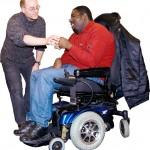
Active Support involves concerns training staff in working practices and organisational procedures to improve levels of resident participation and increase levels of engagement in activities. It is being introduced in many support services for people with learning disabilities to help bring about such improvements. This Australian study set out to look at what happened when Active support was introduced into a large government organisation.
Active support was introduced through a series of training workshops, where 65 staff from 6 group homes were trained by five experienced trainers. The five trainers were then monitored to provide training to a further 54 staff in another 6 group homes.
An evaluation of the training experience was carried out and pre and post outcome data were collected for a small number of service users from the second set of group homes. In addition staff outcome data were collected, relating to working practices, group home management, and staffing practices.
The authors suggest that in practical terms, the ‘train-the-trainer’ approach was an effective way of ensuring large numbers of staff in a government agency received the active support training. They found that the interactive training component was associated with improvements in service user engagement in domestic tasks and also decreased depression levels. Interestingly, staff also reported improved job satisfaction after the training and improvements were recorded in residential working practices.
From their experience, the authors conclude that active support training was effective in empowering staff to better support people with learning disabilities to be meaningfully engaged in daily activities.
Transforming staff practice through active support, Riches C et al in Journal of Intellectual and Developmental Disability, 36, 3, 156-166
